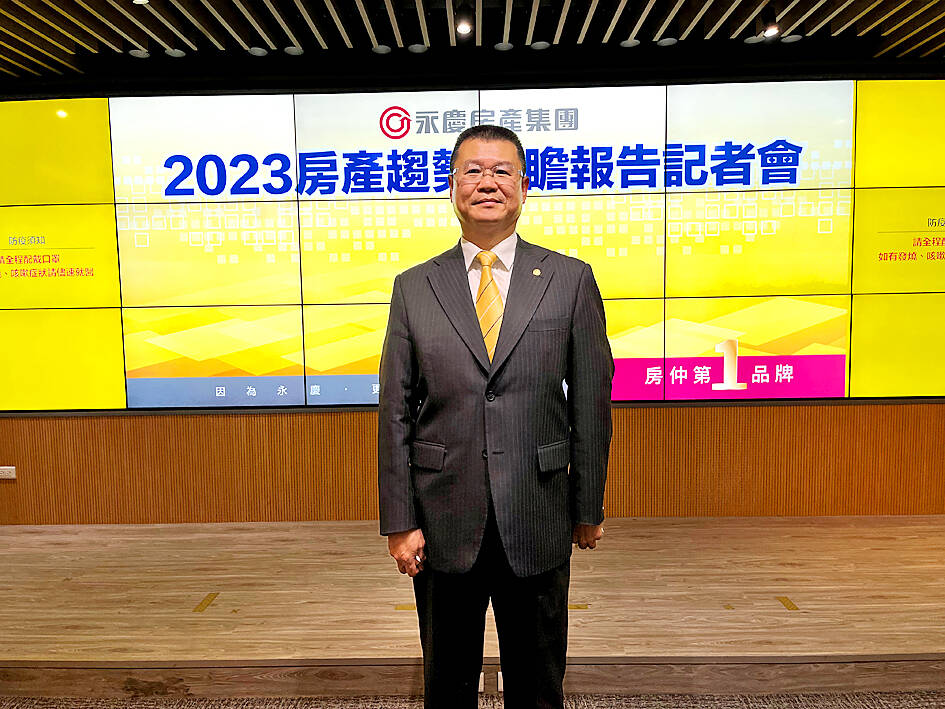Taiwanese have regained confidence in the property market, as slightly more people expect housing prices to rise next quarter, while fewer people expect price corrections, a quarterly survey released yesterday by Evertrust Rehouse Co (永慶房屋) showed.
Thirty-four percent of survey respondents expected housing prices to increase in the coming three months, 5 percentage points higher than the preceding quarter, as recent rallies in the local bourse and sustained inflation eased a bleak outlook, Evertrust research manager Daniel Chen (陳賜傑) said.
Meanwhile, the percentage of people who expected price declines fell 7 percentage points quarter-on-quarter to 33 percent, while another 33 percent held a neutral view, the survey showed.

Photo: Hsu Yi-ping, Taipei Times
While major central banks have maintained their monetary tightening policies, they have eased the pace of interest rate hikes to reduce their effects on the economy, Chen said.
Still, the local and global economies would remain weak for the rest of the year, limiting room for upside development, the analyst said.
About 90 percent of respondents said it would be difficult for Taiwan’s economy to regain traction as exports have contracted for nine straight months and the situation might not improve any time soon, Chen said.
Against that backdrop, the nation’s largest house broker by number of outlets is looking at a 20 percent decline in property transactions in the first half of this year to 140,000, compared with the 22 percent drop it projected in March.
Housing prices would hold firm after a moderate rebound of 0.8 to 4.2 percent in the nation’s seven major cities, Evertrust general manager Yeh Ling-chi (葉凌棋) said, citing an internal survey.
Hsinchu overtook New Taipei City as the city with the second-highest median presale housing prices, which has soared 1.36 times in the past five years, Yeh said.
Median presale housing prices in Taipei remain the most expensive at NT$29.8 million (US$964,713) per unit, Yeh said, adding that two-bedroom apartments would likely continue to be the mainstream products in light of decreases affordability and population.

Taiwan’s long-term economic competitiveness will hinge not only on national champions like Taiwan Semiconductor Manufacturing Co. (TSMC, 台積電) but also on the widespread adoption of artificial intelligence (AI) and other emerging technologies, a US-based scholar has said. At a lecture in Taipei on Tuesday, Jeffrey Ding, assistant professor of political science at the George Washington University and author of "Technology and the Rise of Great Powers," argued that historical experience shows that general-purpose technologies (GPTs) — such as electricity, computers and now AI — shape long-term economic advantages through their diffusion across the broader economy. "What really matters is not who pioneers

In a high-security Shenzhen laboratory, Chinese scientists have built what Washington has spent years trying to prevent: a prototype of a machine capable of producing the cutting-edge semiconductor chips that power artificial intelligence (AI), smartphones and weapons central to Western military dominance, Reuters has learned. Completed early this year and undergoing testing, the prototype fills nearly an entire factory floor. It was built by a team of former engineers from Dutch semiconductor giant ASML who reverse-engineered the company’s extreme ultraviolet lithography (EUV) machines, according to two people with knowledge of the project. EUV machines sit at the heart of a technological Cold

TAIWAN VALUE CHAIN: Foxtron is to fully own Luxgen following the transaction and it plans to launch a new electric model, the Foxtron Bria, in Taiwan next year Yulon Motor Co (裕隆汽車) yesterday said that its board of directors approved the disposal of its electric vehicle (EV) unit, Luxgen Motor Co (納智捷汽車), to Foxtron Vehicle Technologies Co (鴻華先進) for NT$787.6 million (US$24.98 million). Foxtron, a half-half joint venture between Yulon affiliate Hua-Chuang Automobile Information Technical Center Co (華創車電) and Hon Hai Precision Industry Co (鴻海精密), expects to wrap up the deal in the first quarter of next year. Foxtron would fully own Luxgen following the transaction, including five car distributing companies, outlets and all employees. The deal is subject to the approval of the Fair Trade Commission, Foxtron said. “Foxtron will be

INFLATION CONSIDERATION: The BOJ governor said that it would ‘keep making appropriate decisions’ and would adjust depending on the economy and prices The Bank of Japan (BOJ) yesterday raised its benchmark interest rate to the highest in 30 years and said more increases are in the pipeline if conditions allow, in a sign of growing conviction that it can attain the stable inflation target it has pursued for more than a decade. Bank of Japan Governor Kazuo Ueda’s policy board increased the rate by 0.2 percentage points to 0.75 percent, in a unanimous decision, the bank said in a statement. The central bank cited the rising likelihood of its economic outlook being realized. The rate change was expected by all 50 economists surveyed by Bloomberg. The